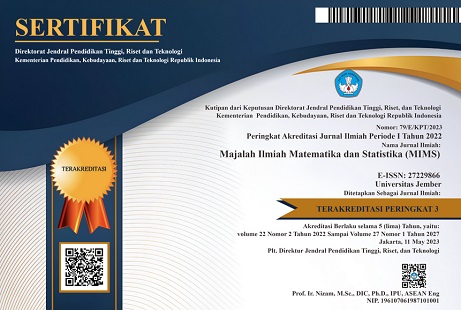PERBANDINGAN MODEL ACCELERATED FAILURE TIME DAN MODEL COX PROPORTIONAL HAZARD PADA KASUS KARDIOVASKULAR
Comparison of the Accelerated Failure Time Model and the Cox Proportional Hazard Model in Cardiovascular Case
Abstract
Cardiovascular disease is a disease that attacks the heart and blood vessels. Many types of cardiovascular diseases, but the most famous are coronary heart disease and stroke. Coronary heart disease is a disease that is the first cause of death that occurs in the world caused by risk factors and the length of time of survival of coronary heart disease patients, then using survival analysis with the Cox Proportional Hazard model and Accelerated Failure Time model. Comparison between Cox Proportional Hazard model and Accelerated Failure Time model expedited time can be determined by the survival time with a safe function, the hazard function and density function (comparison of income) of each questioned duration of time with the help of different AIC policies and the rate of deterioration. Estimation of the survival time of this cardiovascular case is determined from the Cox Proportional Hazard’s hazard ratio model and the Accelerated Failure Time’s time ratio model. The results showed that the Accelerated Failure Time model was better than the Cox Proportional Hazard model because the rate of deterioration and the AIC value was smaller than the other models and related to risk factors, namely the age and status of diabetes mellitus and the length of survival of the patient for 11 days obtained from the estimation of the survival time distribution between the Cox Proportional Hazard model and the Accelerated Failure Time model.
Keywords: Coronary heart disease, survival analysis, Cox Proportional Hazard, Accelerated Failure Time








